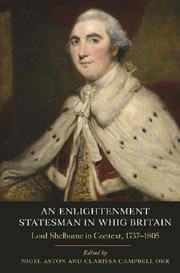Book contents
- Frontmatter
- Contents
- List of Illustrations
- List of Contributors
- Acknowledgements
- List of Abbreviations
- Introduction
- Part One Family, Piety, and Finance
- Part Two Politics
- 5 Shelburne: A Chathamite in Opposition and in Government 1760–82?
- 6 Shelburne and Ireland: Politician, Patriot, Absentee
- 7 Lord Shelburne's Ministry, 1782–3: ‘A Very Good List’
- 8 Shelburne, the European Powers, and the Peace of 1783
- Part Three The Bowood Circle Revisited
- Index
- STUDIES IN EARLY MODERN CULTURAL, POLITICAL AND SOCIAL HISTORY
7 - Lord Shelburne's Ministry, 1782–3: ‘A Very Good List’
from Part Two - Politics
Published online by Cambridge University Press: 05 September 2013
- Frontmatter
- Contents
- List of Illustrations
- List of Contributors
- Acknowledgements
- List of Abbreviations
- Introduction
- Part One Family, Piety, and Finance
- Part Two Politics
- 5 Shelburne: A Chathamite in Opposition and in Government 1760–82?
- 6 Shelburne and Ireland: Politician, Patriot, Absentee
- 7 Lord Shelburne's Ministry, 1782–3: ‘A Very Good List’
- 8 Shelburne, the European Powers, and the Peace of 1783
- Part Three The Bowood Circle Revisited
- Index
- STUDIES IN EARLY MODERN CULTURAL, POLITICAL AND SOCIAL HISTORY
Summary
Among the rather select band of Lord Shelburne's admirers, the young Benjamin Disraeli, author of Coningsby and Sybil, stands out for his enthusiasm, verging on hyperbole. Shelburne, he declared, was one of the suppressed characters of English history, his administration had been brief but not inglorious, and Shelburne himself had been ‘the ablest and most accomplished minister of the eighteenth century’. It was, wrote Disraeli, a mystery that his ministry had failed, and a matter for sad speculation what great things it might have achieved. Shelburne's administrative ability had been conspicuous and his performance in Parliament second only to that of Edmund Burke.
In this somewhat strained panegyric, there are grains of truth. Certainly the portents for Shelburne's ministry when formed in July 1782 after the unexpected death of Lord Rockingham were far from hopeless. Shelburne, though still only forty-five, had been an active member of the House of Lords since his early twenties and had twice held office, the second time as Secretary of State: he had however shown himself to be an uncomfortable colleague, prone to quarrelling, and given to threats of resignation. His parliamentary following, though small, was distinguished, and included Isaac Barré, John Dunning, and James Townsend, capable and experienced debaters. Shelburne was himself a good parliamentary speaker – certainly by comparison with his predecessor, Lord Rockingham, or his successor, the Duke of Portland, though with a tendency to instruct rather than delight, and a liking for vituperation.
- Type
- Chapter
- Information
- An Enlightenment Statesman in Whig BritainLord Shelburne in Context, 1737–1805, pp. 161 - 176Publisher: Boydell & BrewerPrint publication year: 2011



